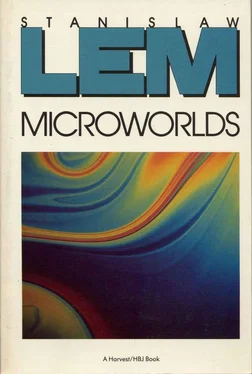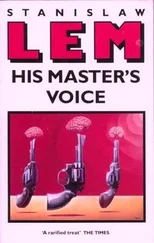The authors attempt to distract the reader from this thought, which flatly forces itself upon us. They stress, for example, that the Golden Ball seen from a distance gives the impression that an unknown giant has accidentally lost it. That, however, is not the correct tactic. It is not the authors’ commentary that should divert us from the structurally obtrusive solution, but the events themselves in their objective unfolding. Then, too, the strong impact the epilogue makes spoils the outstanding impression the book makes overall.
Max Frisch transposed the Oedipus myth into our contemporary reality in his novel Homo Faber, wherein the father as unknowingly enters into an incestuous relationship with his daughter as Oedipus did with his mother. Frisch managed the events of the novel in such a way that each possesses a normal, realistic verisimilitude, while together they structurally correspond to the Oedipus myth. The difference between Homo Faber’ s affinity for myth and Roadside Picnic’ s for the fairy tale lies herein: that Frisch had in mind the achieved similarity while the Strugatskys by no means desired it. That is the very reason why I say that they “have defeated their own purposes,” because only discretion in the arrangement of events could have guarded the end of the story against an unwanted connection with the main plot and hence with the ethos of a fairy tale.
A theologian would have had no difficulty preserving the mystery in Roadside Picnic, for he can employ contradictions. But since science does not have such a recourse, it is not an exaggeration for me to say that the difficulties of a fantasy writer who sides with science are generally greater than those of a theologian who acknowledges the perfection of God… .
Translated from the German by Elsa Schieder and Robert M. Philmus
“About Myself,” Poland, no. 124 (December 1964): 12-13.
“About the Strugatskys’ Roadside Picnic ” (“Poslowie”), Afterword to Arkady and Boris Strugatsky’s Piknik na skraju drogi (Kraków: Wydawnictwo Literackie, 1977); in English: Science-Fiction Studies 10, no. 31 (November 1983): 317-331.
“Cosmology and Science Fiction” (“Science Fiction und Kosmologie”), Science-Fiction Studies 4, no. 12 (July 1977): 107-110. Reprinted in Science-Fiction Studies: Selected Articles on Science Fiction 1976-1977, ed. by R. D. Mullen and Darko Suvin (Boston: Gregg Press, 1978), pp. 214-217.
“Culture and Futurology” (a chapter from Stanislaw Lem’s Summa Technologiae), Polish Perspectives 16, no. 1 (1973): 30-38.
“A Kind of Credo” (“Eine Art Credo”), Quarber Merkur 31 (July 1972); in English: The Yale Literary Magazine 150, no. 5 (1984), pp. 1-2.
“Looking Down on Science Fiction: A Novelist’s Choice for the World’s Worst Writing” (“Science-fiction oder die verunglückte Phantasie”), Frankfurter Allgemeine Zeitung (February 22, 1975); in English: Science-Fiction Studies 4, no. 12 (July 1977): 126-127.
“Metafantasia: The Possibilities of Science Fiction” (“Zakonczenie metafantastyczne”), from Stanislaw Lena’s Fantastyka i futurologia, tom II (Kraków: Wydawnictwo Literackie, 1970); in English: Science-Fiction Studies 8, no. 23 (March 1981): 54-70.
“On the Structural Analysis of Science Fiction” (“Eine strukturalistische SF-Betrachtung”), Quarber Merkur 23 (May 1970); in English: as “Introduction to a Structural Analysis of SF,” Science Fiction Commentary, no. 9 (February 1970): 34-44. Reprinted in Science-Fiction Studies I, no. I (Spring 1973): 26-33, and in Science-Fiction Studies: Selected Articles on Science Fiction 1973-1975, ed. by R. D. Mullen and Darko Suvin (Boston: Gregg Press, 1976), pp. 1-8.
“Philip K. Dick: A Visionary Among the Charlatans” (“Poslowie”), Afterword to Philip
K. Dick’s Ubik (Kraków: Wydawnictwo Literackie, 1975); in English: Science-Fiction Studies 2, no. 5 (March 1975): 54-67. Reprinted in Science-Fiction Studies: Selected Articles on Science Fiction 1973-1975, ed. by R. D. Mullen and Darko Suvin (Boston: Gregg Press, 1976), pp. 210-223.
“Planetary Chauvinism: Speculation on the ‘Others’ “ (“Stimmen aus dem All”), Playboy (German edition), August 1977; in English: Second Look I, no. 10 (August 1979): 5-9.
“Poland: Science Fiction in the Linguistic Trap” (“Polen: Science Fiction in der linguistischen Falle”), Quarber Merkur 20 (August 1969); in English: The Journal of Omphalistic Epistemology, Supplement No. 1 (August 1969): 1-6. Reprinted in Science Fiction Commentary, no. 9 (February 1970): 27-33, and in Science Fiction Commentary, no. 19 (January-February-March 1971): 89-94.
“Reflections for 1974” (“Refleksja 1974”), Kultura, no. 26 (1974); in English: Polish Perspectives 17, no. 10 (October 1974): 3-8.
“Reflections on My Life” (“Mein Leben”), as “Chance and Order,” The New Yorker, January 30,1984, pp. 88-98. Reprinted as “Stanislaw Lem, 1921- “ in Contemporary Authors Autobiography Series, ed. by Cedria Bryfonski (Detroit: Gale Research Company, 1984), I, 255-266.
“Remarks Occasioned by Dr. Plank’s Essay ‘Quixote’s Mills,’ “ Science-Fiction Studies I, no. 2 (Fall 1973): 78-83.
“Robots in Science Fiction” (“Roboter in der Science Fiction”), Quarber Merkur 21 (November 1969); in English: The Journal of Omphalistic Epistemology, no. 3 (January 1970): 8-20. Reprinted in Science Fiction Commentary, no. 19 (January-March 1971): 117-130, and in SF: The Other Side of Realism, ed. by Thomas D. Clareson (Bowling Green, Ohio: The Popular Press, 1971), pp. 307-326.
“Science Fiction: A Hopeless Case — with Exceptions” (“Science Fiction: Ein hoffnungsloser Fall — mit Ausnahmen”), Quarber Merkur 29 (January 1972); in English: Science Fiction Commentary, nos. 35-37 (July-September 1973): 7-35. Reprinted in Philip K. Dick: Electric Shepherd, ed. by Bruce Gillespie (Melbourne: Norstrilia Press, 1975), pp. 69-94. “Appendix: Ubik as Science Fiction” reprinted, as “Science and Reality in Philip K. Dick’s Ubik,” in A Multitude of Visions, ed. by Cy Chauvin (Baltimore: T-K Graphics, 1975), pp. 35-39.
“Sex in Science Fiction” (“Sex in Science Fiction”), Quarber Merkur 25 (January 1971); in English: Science Fiction Commentary, no. 22 (July 1971): 2-10, 40-49.
“The Ten Commandments: Some Remarks on ‘Paingod and Other Stories’ by Harlan Ellison,” untitled letter in Quarber Merkur 20 (August 1969); in English: The Journal of Omphalistic Epistemology, Supplement No. I (August 1969): 6-7. Reprinted, as “The Ten Commandments for Reading the Magazines,” in Science Fiction Commentary, no. 6 (September 1969): 26; in Science Fiction Commentary, no. 19 (January-March 1971): 9496; and in Science Fiction Commentary Reprint Edition: First Year 1969, SF Commentary Nos. 1-8, ed. by Bruce Gillespie (Melbourne: Bruce Gillespie, 1982), p. 106.
“The Time-Travel Story and Related Matters of Science Fiction Structuring” (“Struktura swiata i struktura dziela II: Fantastyka”), from Stanislaw Lem’s Fantastyka i futurologia, tom I (Kraków: Wydawnictwo Literackie, 1970); in English: Science-Fiction Studies I, no. 3 (Spring 1974): 143-154. Reprinted in Science-Fiction Studies: Selected Articles on Science Fiction 1973-1975, ed. by R. D. Mullen and Darko Suvin (Boston: Gregg Press, 1976), pp. 16-27, and in Science Fiction, ed. by Mark Rose (Englewood Cliffs, NJ: Prentice-Hall, 1976), pp. 72-88.
Читать дальше












